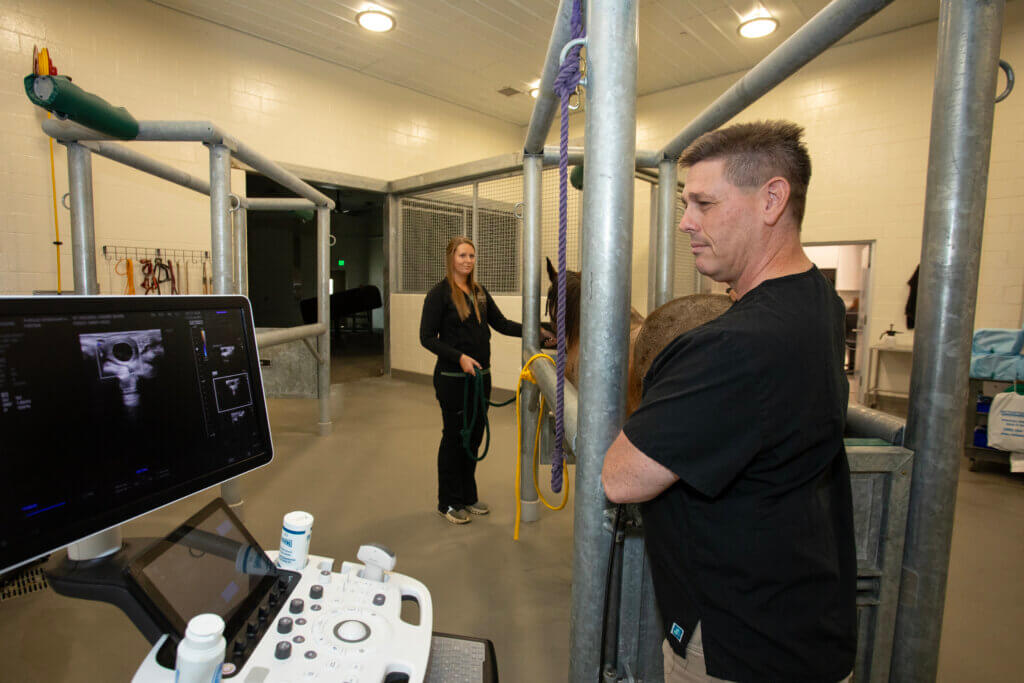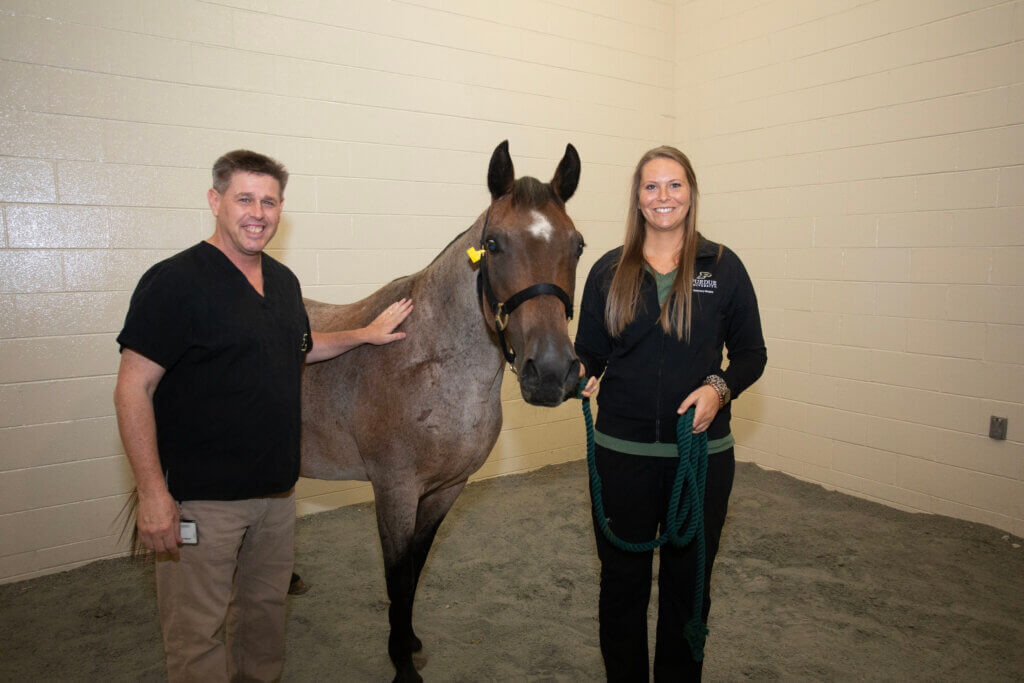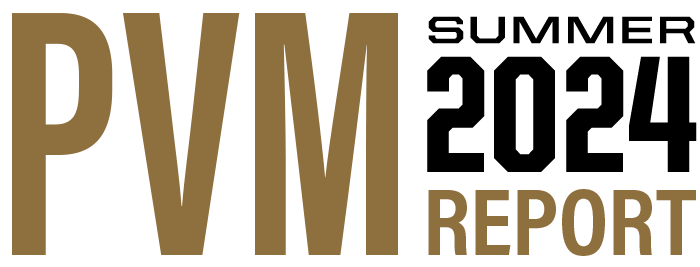
Scroll through the social media pages for the Purdue University College of Veterinary Medicine, and you’ll occasionally see photos, used with permission, showing proud mares with names like Sadie and Garland Superstar standing next to their glistening foals or leaning down to nuzzle them on a bed of straw just after birth.
While not every new colt or filly is announced on Instagram, Facebook and LinkedIn, they are all celebrated by a team led by Justin Hayna, DVM, a theriogenologist who came to Purdue in 2022. Theriogenology is a term encompassing animal reproduction in any species. As clinical assistant professor of equine theriogenology, Dr. Hayna leads a team of veterinary nurses and veterinary medicine students in providing comprehensive reproductive care.
A board-certified theriogenologist with a passion for ensuring the success of every breeding program, Dr. Hayna has more than 20 years of experience in the field. He and his team are dedicated to providing the highest quality of individualized care to support horse owners, whether they’re seasoned or first-time breeders.
Steeped in the equestrian lifestyle
Dr. Hayna grew up in Woodstock, Illinois, one of Chicago’s outermost suburbs. With its rolling plains, well-drained soils and peaceful rural atmosphere, Woodstock and the county it’s located in, McHenry, is an ideal location for equestrians. The area boasts a number of horse farms, riding trails and a calendar full of horse shows.
Inspired by his mom, who showed hunter-jumpers, Dr. Hayna learned to ride as a five-year-old. Then he spent several years competing in the show circuit, riding English in the pony jumper category.
By the time he was 10, Dr. Hayna’s interests had turned to baseball, but his family maintained their show horses for several years. When it came time to choose a career direction, it was Dr. Hayna’s ongoing interest in these majestic creatures that drew him to the field.
“I’m a veterinarian because I really enjoy animals. But what I really love is the science behind animals,” Dr. Hayna says.
After earning undergraduate and veterinary degrees at the University of Illinois, Dr. Hayna completed his residency at the University of Minnesota. He became a diplomate of the American College of Theriogenologists in 2003.
From private practice to academia
Dr. Hayna has treated racehorses, backyard pleasure horses and the horses employed by the United States Park Police. He most recently worked as owner of Mobile Advance Reproductive Equine Services, LLC and as State Veterinarian for the Illinois Racing Board.
When a faculty position at Purdue became available, Dr. Hayna saw an opportunity. “I’d always wanted to be in the academic setting,” says Dr. Hayna, who has published on equine reproduction. “The teaching aspect is really what drove me to the position.”
That, and the chance to forge a new frontier at Purdue.
“Purdue has not had a reputation, really good or bad, in my area, for really as long as I’ve been involved with this,” he says. While its veterinary hospitals had been known for cattle and small animal reproduction, horse reproduction had not been a main area of focus.
“When this position was posted, it was interesting. I thought, are they trying something new?” Dr. Hayna says. “That, combined with the new hospital, really represented this nexus of thought – they were going to get into a type of medicine that they hadn’t done a lot here.”
A full spectrum of care
Inside the state-of-the-art equine hospital, Dr. Hayna and his team offer comprehensive reproductive care, including:
- Mare services: from routine breeding to advanced procedures such as embryo transfer and high-risk pregnancy management
- Stallion services: including semen collection and evaluation, processing and shipping, breeding soundness exams and investigation of infertility
- Additional services: pregnancy monitoring, dystocia management, artificial insemination and the availability of clinical studies
- 24/7 emergency care for sick or injured breeding animals
Clients come from Chicago, most of Indiana, southern Michigan and the tri-state area of Indiana, Kentucky and Ohio around Cincinnati. While general veterinarians can and do refer clients to Purdue, horse owners are welcome to self-refer.
Hands-on learning
As a professor, Dr. Hayna lectures and supervises students in their clinical rotations. All third-year veterinary students at Purdue take comparative theriogenology. Dr. Hayna covers horses and several other major species, with other faculty members discussing cow and pig reproduction.
Dr. Hayna also runs a small lab where he teaches patient techniques including transrectal palpation, ultrasound and artificial insemination, along with detailed lessons in horse reproductive anatomy.
During clinical rotations, students are intimately involved in every case. “If we’re breeding a mare, we’re utilizing the students to do the prep work, the artificial insemination if we can, and making sure the precursors of our work – semen and eggs – are as healthy as possible,” he says.
Plans for growth
Looking out on the horizon, Dr. Hayna wants to expand Purdue’s equine theriogenology services, particularly for the benefit of up-and-coming specialists.
“I’m on the back side of my career. I want the service here to improve and get bigger – to be honest – so that I can teach my replacement. My mentor told me when I got this position, ‘Great, now go find your replacement, and then after you find them, go find another.’
Teach and pass on. Inspire the next set of reproduction specialists. It’s still that passion that drives me.”


